Marty Pasetta
An EIN spotlight on Aloha producer Marty Pasetta
|
Marty Pasetta "Aloha" Producer Dead at 82: Marty Pasetta, best known for directing Elvis' 'Aloha From Hawaii' spectacular and his works with the Academy Awards telecast annually from 1972 to 1988, died Thursday night. He was 82.
Pasetta was accidentily struck by a car he had just exited in La Quinta, Calif. He died at the scene, police said.
The driver stopped his vehicle to drop off Pasetta and another passenger. Stewart then went to exit his vehicle, but accidentally left the car’s transmission engaged, causing him to crash into his passengers. (Right:Elvis, Waterson & Pasetta)
Pasetta helmed “Elvis: Aloha From Hawaii,” which aired on Jan. 14, 1973, in more than 40 countries. The concert special, featuring Elvis Presley at the Honolulu International Center, remains one of the most watched TV programs in history. |
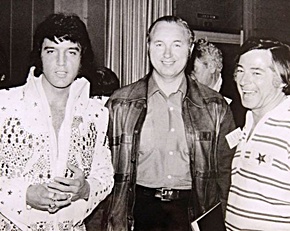 |
When Pasetta was chosen to take reins of the 60th Annual Academy Awards in 1988, he set an all-time 17-year record for directing the event. He also produced and directed eight live Grammy Awards and Emmy telecasts.
Pasetta’s other notable credits include “AFI Life Achievement Award: A Tribute to Fred Astaire” (1981), “The Smother Brothers Comedy Hour” (1967) and TV inaugural galas for presidents Jimmy Carter and Ronald Reagan. |
More on Marty Pasetta: Jefry Abraham was the person who interviewed Marty Pasetta in great detail for The Television Academy’s Archive Program. He also happens to be the publicist for director/producer Steve Binder.
Jefry Abraham recently contacted EIN and we talked about Marty Pasetta who recently passed away..
EIN - Marty Pasetta comes across as a remarkably humble man for all the legendary TV productions that he originated.
What was he like "off camera" and did he realise exactly what he had achieved?
Jeff A: That interview was the first time I met Marty, but we immediately connected once we started the interview. He was nothing but utterly charming. I do remember at the end of the 3 hour session he did feel quite humbled having his entire life laid in front of him.
He did know what he achieved, but he never spoke as a bragger.
|
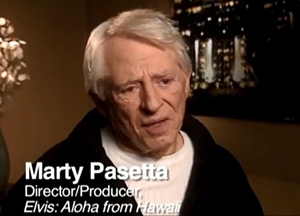 |
EIN: Do you know if he had any more interaction with Elvis or The Colonel after the special was aired?
Jeff A: I do believe Marty did see Elvis in Vegas after the special and he went backstage.
EIN: Do you know any of Marty's feelings about the 2010 deluxe expanded DVD release?
Jeff A: The interview was done in 2007 so I can’t answer this question. I never asked him afterwards.
EIN: In Pasetta's interview he often mentions that he saw Elvis Live in Santa Monica. However that cannot be right! Elvis didn't perform in Santa Monica that year.
Personally I think he saw Elvis at Long Beach (Nov 14/ 15 1972).
Jeff A: You have to remember this interview was done 35 years after the fact he first Elvis.
My educated guess was that Marty saw Elvis in Long Beach as it was closer to Los Angeles. You have to remember these people did so much in the career, they don’t remember every detail.
I apologize in that I’m not an Elvis expert, so I did not catch that error of Santa Monica. Otherwise, I would have corrected him.
Also, when doing these interviews, you don’t want the subjects to lose their train of thought, so you don’t correct while they are speaking.
I would done have it before the next question, had I known.
EIN: Do you have anything else you would like add about Marty Pasetta, the man?
Jeff A: I ran into Marty a few years later and we had a wonderful chat and he could not have been any nicer.
Go HERE for FULL Jeff Abraham Marty Pasetta Interview
|
|
Director Marty Pasetta Talks about 'Aloha': Forty years ago last month, NBC aired the 90-minute special 'Elvis: Aloha From Hawaii via Satellite' after a shorter version was seen around the globe LIVE on Jan. 14, 1973. (Right:Elvis, Waterson & Pasetta)
It was the first time satellite technology was used to transmit a live concert around the world and the project gave Presley one last magnificent credit to add to his legend.
The idea for a satellite broadcast was conceived by Presley's manager, Col Parker, while they both lived part-time in Palm Springs in 1972. Parker sold the idea to RCA, which owned NBC, and NBC's vice president of nighttime programming, part-time Palm Springs resident John Hamlin, assigned it to Marty Pasetta.
Pasetta, 81, who now lives in La Quinta, Calif., says he's not sure how many people saw the broadcast.
"What I was told by NBC and others is that every third person on Earth saw that first show when it went out," Pasetta said in his memorabilia-laden home office. "In Africa and places like that, it played in theaters. They didn't have television." |
 |
By the accounts of those closest to him, the Aloha concert was the last time Presley suspended his prescription drug abuse and performed at his optimum 175-pound weight.
Biographer Peter Guralnick and Sonny West credit Pasetta for inspiring the singer to clean up his act. After meeting Pasetta, West said that Elvis insisted that he and two other bodyguards join him on a diet to burn up the fat in his system. Pasetta said he told Presley at their first sit-down meeting, attended by two bodyguards, he had to lose weight before the concert.
"He sat straight and the guys on either side of him took out their guns and laid them down on the table, and if you don't think I was scared, you're crazy.
"I said, 'I want you skinny because I'm going to use close-ups,' which wasn't very popular in television in those days. I said, 'I'm going to go from your neck to the top of your head. That's going to be your sex appeal on the tube, along with your voice, and it's going to make a landmark.'
"He jumped out his chair. He grabbed me, put his arms around me and said, 'You're the first person who was ever honest to me.' He said, 'I will lose the weight for you,' and he lost 20 pounds in two months."
Working with Elvis
Pasetta was just coming off his Academy Awards broadcast directorial debut when Hamlin offered him the opportunity to work with Presley. Pasetta wasn't sure he wanted to do it at first. Hamlin told him to watch Presley at the Long Beach Arena that November and Presley gave an uninspiring performance.
|
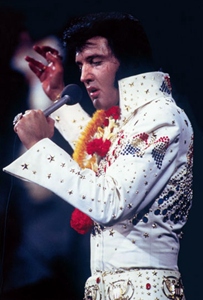 |
"He stood there like a lump," said Pasetta. "He didn't do anything. I went back to NBC and said, 'Hey, guys, what am I going to do with this guy? How long is the show? 90 minutes? I can't tap dance that much. It doesn't look like he's going to move.' They said, 'That's your problem.' "
The concert film would feature Presley giving a one-hour benefit concert at the HIC Center. Pasetta tried to provide an international reach by putting Elvis' name on the set in various international alphabets and fonts. He also tried to convey Presley's romantic appeal, much to Parker's consternation.
"I wanted to put a runway in, 8 foot wide, so he could walk down the center," said Pasetta. "I wanted to put girls around there and I wanted the stage 6 feet off of the floor. The Colonel always had the stage 10 feet above the floor and he had guards across the front. He didn't want to have anybody touch his boy.
"When I told this to the Colonel, he had a fit. He said, 'I'm not lowering the stage. I'm going to have my guards there and he can stand there and sing.' I said, 'That's not going to work on the tube for an hour and a half show.' He said, 'No. I won't do it. You can't do the show.' "
But Pasetta says Presley loved his ideas and, in one of the few instances in his career, he overruled his manager.
|
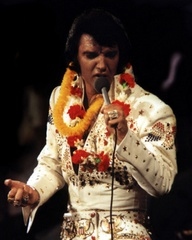 |
"Elvis said to me, 'The Colonel controls my business. I control my creativity and my music and my show. He has nothing to say about it. That's your rule. You will deal with Joe Esposito'," said Pasetta. "I talked to Joe, the Colonel — everybody. But I tried not to deal too much with the Colonel. I had enough problems getting the show on."
The production however was fraught with technical problems. A day before the broadcast, it was discovered someone had cut the power lines going into the auditorium. Pasetta called Don Ho and, "He got people out of bed and they came back and fixed it just in time."
The day of the show, it was discovered the backstage equipment was creating a humming sound. Pasetta called Ho again and, "Don said, 'Call the Navy yard.' We had a truckload lead sheets that were brought over two hours before the show and we lined them up and got our sound back."
Then, at the start of the show, knowing they had to shoot the entire concert continuously, "My technical director froze on me," Pasetta said. "I had to cut the first part of the show. He was nervous."
The soundtrack entered the Billboard charts on Feb. 24, bolstered by Presley's best reviews in years. It would be his last No. 1 album. The next week, Parker signed a seven-year deal for Presley to remain with RCA.
Aloha From Hawaii also temporarily quieted demands for Presley to tour overseas, something Parker was reticent to do.
(News, Source;USAToday/ElvisInfoNet) |
Marty Pasetta - One of The Best Elvis ever worked with: Marty Lacker wrote to EIN about our Marty Pasetta article. (see above)
... It was nice to hear that Marty Pasetta is still going strong as he was one of the nicest people we ever worked with.
It was surprising yet refreshing to hear what he was thinking back then as his actions and words were always praising and encouraging to Elvis and some of us. I got to know him fairly well although I have not spoken to him since a few years after Aloha when he Directed and produced The Grammys Award Show from Nashville and I got him to add The Staple Singers and Al Green as performers so Memphis would be represented on the show. He was very accommodating to me by doing that.
It was typical of Parker and his bullshit about the runway height, whenever he got involved in the production side of anything Elvis did, he always messed it up which hurt Elvis' career.
(Photo right is of Elvis thanking Marty Pasetta after the Aloha Rehearsal - From the new Deluxe Boxcar book see here for more previously unpublished photos)
Marty almost got it right in his comments about Parker and touring outside the U.S. He came up with the idea of the satellite show for his own selfish reasons. Not just because of the money he made but this was his way of not having Elvis tour outside the U.S. because Parker did not want Elvis to do that without Parker travelling with him but we now know that Parker was an illegal alien and he was afraid he would be discovered and deported or |
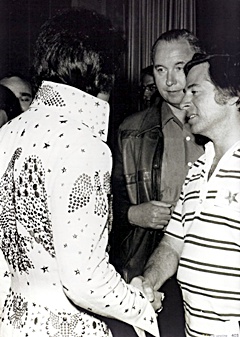 |
jailed because of it and if he managed to go he was afraid he wouldn't be allowed back in to the U.S. because of it plus he might not have been able to get a passport without a valid birth certificate proving he was an American citizen.
I found it humorous too that Elvis told Marty to deal with Esposito instead of Parker because they were basically one and the same. Joe probably told Parker everything Marty wanted because Joe was his boy.
However because he knew better I'm sure he also told Elvis what Marty Pasetta said.
- Marty Lacker. |
Marty Pasetta & "The Making Of Aloha" : EIN contributor Rob Salamanca has made this wonderful 14 minute video about "Marty Pasetta and the making of Aloha From Hawaii".
In it Producer /Director Marty Pasetta talks about the making of NBC's Aloha from Hawaii the first live concert broadcast worldwide via satellite starring Elvis Presley and it features some marvellous Elvis clips.
It runs 14 minutes - Click here to watch.
At their firrst sit-down meeting, attended by two bodyguards, Pasetta said he told Presley he had to lose weight before the concert.
"Elvis sat straight and the guys on either side of him took out their guns and laid them down on the table, and if you don't think I was scared, you're crazy." |
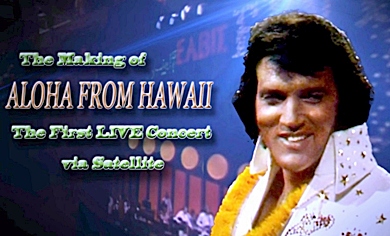 |
On May 21st this year Marty Pasetta sadly died in a car accident - he was 82 years old.
Marty Pasetta June 16, 1932 – May 21, 2015 - RIP
"One of The Best Elvis ever worked with"- Marty Lacker
For more on Marty Pasetta go HERE to EIN's Spotlight.
(News, Source;ElvisInfoNet) |
Please note, the interview included with Marty Pasetta comes from an interview Jeff Abraham conducted for The Television Academy’s Archive Program. The interview was done in his home in Los Angeles on January 18, 2007.
EIN and Rob Salamanca credits Jeff Abraham and Television Academy as the source material.
"In the original three-hour Archive interview, Marty Pasetta (1932-2015) talks about his early interest in theater his first job at San Francisco's KGO-TV and his long association with The Grammy Awards (from 1971-78), where he was hired for the show's first live telecast and details his long stint as director of The Academy Awards (from 1972-88).
He also speaks in great detail about his favorite project, Elvis: Aloha from Hawaii, which was Elvis' 1973 satellite special.
Go HERE for the full interview and more information.
|
 |
Spotlight written by Piers Beagley
-Copyright EIN, May 2015
ALOHA HAWAII 40th Anniversary - The King "live via satellite" a Great Experience in 2013: The local Honolulu newspaper gave Elvis' 'Aloha From Hawaii 2013' a great review. Longtime arts journalist John Berger reported...
... Any lingering suspicions that the long-anticipated "Elvis ‘Aloha from Hawaii’ 40th Anniversary Screening" was going to amount to a shared viewing of the familiar television special that’s available for free on YouTube were laid to rest as soon as the lights went down on several thousand Elvis fans who’d assembled to celebrate The King’s "live via satellite" concert last night in Blaisdell Arena.
First, there is no way that watching anything on a p/c screen — or even a "home entertainment center" — can match the experience of seeing it on a theater-size screen and hearing it on an arena sound system.
Second, the 40-year-old television special was dramatically modernized and upgraded for the anniversary screening. The entire concert was re- |
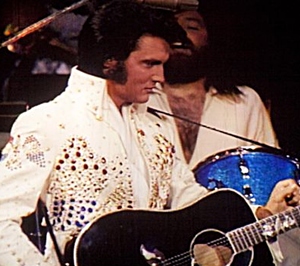 |
imagined as a multi-image experience — at times there were two or three images on the giant screen, at others there were 16 or more in various combinations.
Hawaii Gov. Neil Abercrombie sent a shout out to the people who were seated "right up there in the upper deck" where he had been sitting 40 years ago, and asked everyone who had been in the audience for the original "Aloha from Hawaii" concert to stand — and a notable number of people did. The bottom line to the evening was about more than commemorating an entertainment milestone 40 years on. It was remembering or, perhaps, learning that before there were Elvis impersonators mumbling "thankyuverrymuch," and tribute artists and look-alikes and "weekend warrior" karaoke singers, there was a flesh-and-blood entertainer named Elvis Presley who created something fresh and new and revolutionary in American music.
So much that the entertainers of today and their fans take for granted began with Elvis.
Go here for NEW images of the 2013 concert EIN EXCLUSIVE REVIEW plus much more on Aloha 2013.
(News, Source;ElvisInfoNet) |
'Elvis - Aloha Via Satellite: A 40th Anniv Release': Getting rave reviews from Elvis fans - "this book is just nothing short of incredible!", "Beautiful packaging and quality all the way through", "my first thoughts on the book are WOW the photos are incredible so sharp, many I have never seen before", "Really enjoy following the whole story in chronological order, and some of those black and white rehearsal show shots are astounding" - are just some comments on FECC.
The latest release celebrating the 40th Anniversary of Aloha Via Satellite from Joseph Pirzada’s Boxcar label dropped into the EIN mail box. With considerable pre-publication hype, a stunning 440 pages and more than 1,000 visuals, many of them "alternate" shots or unpublished, can it really be as good as we all hope. Is this the ultimate photo-journal about Aloha? GO HERE AS EIN brings you the first on-line detailed review.
Click here for our detailed review by Nigel Patterson - including plenty of fabulous Aloha Elvis images
(Book Review, Source: ElvisInformationNetwork) |
|
|
|



